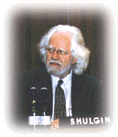Link and Clip:
http://www.mdma.net/alexander-shulgin/21stc.html
21st Century Highs
The Future of Psychedelics
An interview with Alexander T. "Sasha" Shulgin by Dee Alexander Shulgin is the world's foremost developer and explorer of psychedelic drugs. Born in 1925, this self-described "manic libertarian psychedelic chemist", over the past 30 odd years or so, has been a prolific writer and his publications (150 scientific papers, 20 patents and a handful of books) provide a great introduction into the world of psychedelics and also he is the discover of DOM (at one time known as STP), MMDA and many other psychedelics and is generally regarded as the reinventor or stepfather of MDMA (Ecstasy - E).
With a PhD in Biochemistry from UC Berkeley, he has been a scientific consultant for such state-run organisations as The US National Institute on Drug Abuse, NASA, the US Drug Enforcement Organisation etc., but in private, has used his government licensed research lab, discreetly, but legally, designing hundreds of new psychoactive compounds, together with his wife Ann and a small, but dedicated research team, who sample each new drug as it's developed. Through cautious escalation of dosage, they discover and map out the range of each new drug's effects, experimenting with the various aspects of their psychological and/or spiritual potential.
In fact, one of the reasons he decided to write his autobiographical "chemical love story" Pihkal (Phenethylamines I Have Known and Loved) and its continuation, Tihkal (Tryptamines I Have Known and Loved), published late in 1997 and reviewed in Fringecore 2, was because he could see the need to get a lot of information published into a form that could not be destroyed. The books not only detail Sasha and Ann's remarkable adventures, but also set out recipes for recreating hundreds of Sasha's finely crafted magic molecules.
Sasha claims to be inspired partly by the history of Wilhelm Reich and considers Castanada to be his model and hero, not only seeing psychedelics as a potential enrichment to everyday life, but also as a means to increasing personal insight and expansion of one's mental and emotional horizons.
Psychedelics may be best defined as physically non-addictive compounds which temporarily alter the state of one's consciousness. Sasha believes that the use of psychedelic drugs, including the minor risks involved (an occasional difficult experience or perhaps some body malaise) are more than balanced by the potential for learning. He has a strong preference for psychedelics over heroin or cocaine (especially crack), both of which he has tried, because he feels both tend to allow the user to escape from who he or she really is, even to the point, from who you are not. Heroin, in particular, he feels, creates a loss of motivation and alertness and under its influence, nothing seems important to him. Cocaine, on the other hand stimulates a sense of power, but also the inescapable knowledge that it is not true power.
There is a healthy dose of humour in Sasha's writings and I was looking forward to talking with him about the future of psychedelics and the likely highs for the 21st C.
Dee: What effect will future users be looking for, particularly in terms of ASC (Altered State of Consciousness)?
Sasha Shulgin: The effects that will be sought by future users of psychedelic drugs will, I believe, depend on the circumstances of their
